Loading AI tools
Association football league From Wikipedia, the free encyclopedia
The Thai League 1 (Thai: ไทยลีก 1, pronounced as ไท-หลีก-หนึ่ง), often referred to as T1, is the highest level of the Thai football league system. Contested by 16 clubs, it operates on a system of promotion and relegation with Thai League 2. Seasons typically run from August to May, with each team playing 30 games: two against each other team, one home and one away. It is sponsored by Toyota Motor Thailand and therefore officially known as the Hilux Revo Thai League. In the Thai League, most games are played on Saturday and Sunday evenings, occasionally being played on Wednesday and Friday evening fixtures.[1][2]
This article needs additional citations for verification. (December 2017) |
 | |
| Organising body | Thai League |
|---|---|
| Founded | 1996 |
| First season | 1996–97 |
| Country | Thailand |
| Confederation | AFC |
| Number of teams | 16 (since 2019) |
| Level on pyramid | 1 |
| Relegation to | Thai League 2 |
| Domestic cup(s) | Thai FA Cup Thailand Champions Cup |
| League cup(s) | Thai League Cup |
| International cup(s) | |
| Current champions | Buriram United (10th title) (2023–24) |
| Most championships | Buriram United (10 titles) |
| Most appearances | Rangsan Viwatchaichok (439) |
| Top goalscorer | Heberty (159) |
| TV partners | TrueVisions |
| Website | thaileague |
| Current: 2024–25 Thai League 1 | |
Thailand has had league-football competition since 1916. Before the inception of the Thai League, the highest level of club football was the semi-professional league Kor Royal Cup (Thai: ถ้วย ก.) which was contested in a tournament format from 1916 to 1995.
Thai League was introduced in 1996 by the Football Association of Thailand (FA Thailand) under the name Thailand Soccer League. Eighteen clubs who earlier competed for the Kor Royal Cup were registered to play in the first edition of a double round-robin league system.[3] Bangkok Bank was crowned as the first champion of the 1996–97 Thailand Soccer League.
The Thai League originally had 10 to 12 clubs each season until 2007, when it was expanded to 16 clubs. At the end of each season, the three bottom placed clubs are relegated to the Thai Division 1 League.
Most of Thai League clubs in that time were the organisation of government authorities club that based in Greater Bangkok and Metropolitan. Meanwhile, the other local clubs had competed in the semi-pro league called the Provincial League. Thai Premier League faced the issue of low attendance and lack of local loyalties while the Provincial league suffered the financial issue. In 2007, Thai League was integrated with Provincial League completely. Chonburi from the Provincial League was the first champion of the new Thailand Premier League in the 2007 season.
In 2009 season, there were significant changes in the lead to the new era of the Thai Premier League. Asian Football Confederation declared the regulations for the associations that have the intention to send the clubs to compete in the AFC Champions League starting from 2011.[4] Football Association of Thailand had to establish Thai Premier League co.ltd and forced the clubs in the top league to complete AFC Club License Criteria[5] otherwise Thai clubs will not eligible to play in the Champions League. Clubs were forced to separate themselves from the parent organisations and registered as the independent football authorities.
The massive changes occurred in that season. Thailand Premier League renamed to Thai Premier League. Two times league champion Krung Thai Bank failed to complete the new regulations. The organisation decided to sell the club. The club was acquired by Boon Rawd and rebranded to be Bangkok Glass. Bangkok University had expelled their football club section. The club rebrand itself to Bangkok United since then. The organisation-based clubs had to relocate to find the local supporters to backup the clubs. Osotspa changed their home stadium to Saraburi Province, TOT moved to play in Kanchanaburi, Royal Navy played in Rayong Province while Thailand Tobacco Monopoly integrated to Samut Sakhon Province and rebranded to TTM Samut Sakhon.
Muangthong United were promoted from Thai Division 1 League in that season and won Thai Premier League in their first year in the top league.
Thailand Clasico or The Classic Match of Thailand is the matchup between Muangthong United and Chonburi. It is the matchup that presents Thai football in the modern era. The name was given to the encounter of two teams due to the hype and massive atmosphere around the match. The first encounter between them happened in the 2009 Thai Premier League season. On 30 May 2009, Chonburi that was regarded as the best club in Thailand at that moment hosted the new powerhouse who were just promoted from Division 1 Muangthong United. The match was played at Nong Prue Stadium, Pattaya. Before the match, Chonburi was the leader in the table after 10 matches of the season while Muangthong followed in second with one less point. Chonburi made the lead by 2–0 in the first thirty minutes but Muangthong bounced back to win by the 5–2 result at the end.
In the 2012 season, Muangthong United under Serbian head coach Slaviša Jokanović, had become the first club in the league history that completed the season with an unbeaten record. Muangthong finished at the top of the final standing with 25 wins and 9 draws.[6]
The Buriram Dominance refers to the 2013 to 2015 season, when Buriram United won Thai Premier League in three consecutive seasons as the first club in the league history. The three titles in that period included two invincible titles which Buriram United completed Thai Premier League campaign unbeaten in 2013 and 2015 season.[7][8]

In 2017, Football Association of Thailand decided to rebrand Thai Premier League into Thai League 1.[9] Since its inception in 1996 the Thai Premier League has relied upon local sponsorship. Re-branding initiatives seek to foster an international identity for the Thai and elevate the league globally through commitment to world-class level management and marketing which incorporates multifaceted promotion through various media to draw attention to league competition and cups.[10][11] This rebranding earned the Good Design Award in the Brand Identity branch from the Japan Institute of Design Promotion.[12]
The rebranding of the Thai League from 2017 to 2023 has been well received in terms of viewership with a large number of visitors to the stadium[13] and watching through live broadcasts[14] but in terms of benefits, the Thai League receives royalties for broadcasting live matches at an ever-lower value after the end of season 2022-23 Thai League is only worth 50 million baht, an amount that risks collapsing the league.[15]
On Tuesday, June 27, 2023, Kornwee Phrissanantakul, Acting Chief Executive Officer of Thai League Company Limited and Patis Supapong, Secretary General of the Football Association of Thailand in the Royal Patronage has called a meeting of representatives of 16 Thai League member clubs to find a solution and offer suggestions after the auction to buy Thai League licenses is not as expected. The recommendation from the majority of 16 teams is for all 16 teams to manage and find benefits among themselves (Premier League Model), which will bring information and details to the Association Executive Council meeting on Monday 3 July.[16]
On July 18, 2023, the Thai League club meeting launched the #SAVETHAILEAGUE initiative to raise funds for Thai League clubs directly from football fans by purchasing a package to watch live broadcasts directly from your favorite team to address the issue of low Thai League values.[17][18]
There are 16 clubs in the league, with three promoted teams from Thai League 2 replacing the three teams that were relegated from the 2023-24 season.
Chonburi, Police Tero and Trat were relegated at the end of the 2023–24 season after finishing in the bottom three places of the table. They were replaced by 2023-24 Thai League 2 champions Nakhon Ratchasima. They were joined by runners-up Nongbua Pitchaya, who also got promoted back after relegated two season before, and Rayong, promotion plays-off winner.

| Team | Province | Stadium | Capacity |
|---|---|---|---|
| Bangkok United | Pathum Thani (Rangsit) | Thammasat Stadium | 19,375 |
| BG Pathum United | Pathum Thani (Thanyaburi) | BG Stadium | 15,114 |
| Buriram United | Buriram | Chang Arena | 32,600 |
| Chiangrai United | Chiang Rai | Singha Chiangrai Stadium | 13,000 |
| Khonkaen United | Khon Kaen | Khonkaen PAO. Stadium | 7,000 |
| Lamphun Warriors | Lamphun | Lamphun Warriors Stadium | 5,000 |
| Muangthong United | Nonthaburi | Thunderdome Stadium | 12,505 |
| Nakhon Pathom United | Nakhon Pathom | Nakhon Pathom Municipality Sport School Stadium | 6,000 |
| Nakhon Ratchasima | Nakhon Ratchasima | 80th Birthday Stadium | 24,641 |
| Nongbua Pitchaya | Nongbua Lamphu | Pitchaya Stadium | 6,000 |
| Port | Bangkok (Khlong Toei) | PAT Stadium | 6,000 |
| PT Prachuap | Prachuap Khiri Khan | Sam Ao Stadium | 5,000 |
| Ratchaburi | Ratchaburi | Dragon Solar Park | 10,000 |
| Rayong | Rayong | Rayong Provincial Stadium | 7,500 |
| Sukhothai | Sukhothai | Thung Thalay Luang Stadium | 8,000 |
| Uthai Thani | Uthai Thani | Uthai Thani Provincial Stadium | 5,477 |
| Bangkok United | BG Pathum United | Buriram United | Chiangrai United |
|---|---|---|---|
| Thammasat Stadium | BG Stadium | Chang Arena | Leo Chiangrai Stadium |
| Capacity: 25,000 | Capacity: 15,114 | Capacity: 32,600 | Capacity: 11,354 |
 |
 |
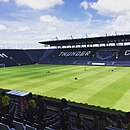 |
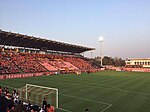 |
| Khon Kaen United | Lamphun Warriors | Muangthong United | Nakhon Pathom United |
| Khonkaen PAO. Stadium | Lamphun Warriors Stadium | Thunderdome Stadium | Nakhon Pathom School Stadium |
| Capacity: 7,000 | Capacity: 5,000 | Capacity: 15,000 | Capacity: 6,000 |
 |
 |
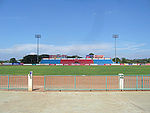 | |
| Nakhon Ratchasima | Nongbua Pitchaya | Port | PT Prachuap |
| 80th Birthday Stadium | Pitchaya Stadium | PAT Stadium | Sam Ao Stadium |
| Capacity: 24,641 | Capacity: 6,000 | Capacity: 6,000 | Capacity: 5,000 |
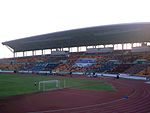 |
 |
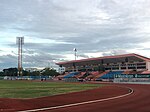 | |
| Ratchaburi | Rayong | Sukhothai | Uthai Thani |
| Dragon Solar Park | Rayong Province Stadium | Thung Thalay Luang Stadium | Uthai Thani Provincial Stadium |
| Capacity: 10,000 | Capacity: 7,500 | Capacity: 9,500 | Capacity: 4,477 |
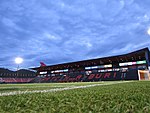 |
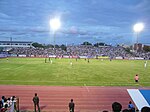 |
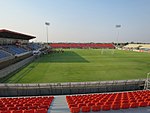 |
 |
Unbeatable champions:
| Club | Winners | Winning seasons |
|---|---|---|
| Buriram United | 10 |
2008, 2011, 2013, 2014, 2015, 2017, 2018, 2021–22, 2022–23, 2023–24 |
| Muangthong United | 4 |
2009, 2010, 2012, 2016 |
| Royal Thai Air Force | 2 | 1997, 1999 |
| BEC Tero Sasana | 2000, 2001–02 | |
| Krung Thai Bank | 2002–03, 2003–04 | |
| Bangkok Bank | 1 | 1996–97 |
| Sinthana | 1998 | |
| Thailand Tobacco Monopoly | 2004–05 | |
| Bangkok United | 2006 | |
| Chonburi | 2007 | |
| Chiangrai United | 2019 | |
| BG Pathum United | 2020–21 | |
| Rank | Player | Years | Goals | Apps | Ratio |
|---|---|---|---|---|---|
| 1 | 2014–2023 | 159 | 249 | 0.64 | |
| 2 | 2010–2019 | 144 | 193 | 0.73 | |
| 3 | 2009–2017, 2019, 2021– | 143 | 336 | 0.43 | |
| 4 | 2015–2022 | 118 | 132 | 0.89 | |
| 5 | 2013–2021 | 118 | 209 | 0.56 | |
| 6 | 2011–2021 | 116 | 227 | 0.51 | |
| 7 | 2006–2019 | 108 | 404 | 0.27 | |
| 8 | 2001–2004, 2007–2013–2014 | 101 | 233 | 0.43 | |
| 9 | 2006–2014, 2016–2022 | 96 | 206 | 0.47 | |
| 10 | 2012–2019 | 93 | 197 | 0.47 | |
Figures for active players (in bold).
| Rank | Player | Position | Apps | Goals |
|---|---|---|---|---|
| 1 | MF | 439 | 49 | |
| 2 | GK | 433 | 0 | |
| 3 | FW | 402 | 108 | |
| 4 | GK | 397 | 1 | |
| 5 | FW | 351 | 143 | |
| 6 | MF | 340 | 62 | |
| 7 | DF | 335 | 19 | |
| 8 | GK | 315 | 1 | |
| 9 | DF | 262 | 7 | |
| 10 | FW | 249 | 159 | |
Figures for active players (in bold).


|
| ||||||||||||||||||||||||||||||||||||||||||||||||||||||||||||||||||||||||||||||||||||||||
|
| |||||||||||||||||||||||||||||||||||||||||||||||||||||||||||||||||||||||||||||||||||||||||||
There are 16 clubs in the Thai League. During the course of a season, which lasts from August to May, each club plays the others twice, once at their home stadium and once at that of their opponents, for a total of 30 games. Teams receive three points for a win and one point for a draw. No points are awarded for a loss. Teams are ranked by total points, then head-to-head, then goal difference, and then goals scored. At the end of each season, the club with the most points is crowned champion. If points are equal, the head-to-head, the goal difference and then goals scored determine the winner. If still equal, teams are deemed to occupy the same position. If there is a tie for the championship, for relegation, or for qualification to other competitions, a play-off match at a neutral venue decides rank. The three lowest placed teams are relegated into the Thai League 2 and the top three teams from the Thai League 2 are promoted in their place.
In the past the champions played in AFC Champions League playoffs and AFC Cup for the champions of Thai FA Cup. Due to reforms from the AFC for the AFC Champions League and AFC Cup format, there is no more a direct qualification spot for the AFC Champions League for that Thai Champion, for the time being.[22] From 2012 Thai clubs has 1 automatic spot to the group stage and 1 playoff spot for the Thai FA Cup Winners and 1 playoff spot for the thai league runner-up. However, since 2021, Thai clubs have two group stage spots for League Champion and FA Cup winner, and two teams in play-off spots for runner-up and third in the league.
To be used for allocating slots in the 2024–25 season.
Updated on 25 May 2022.(Source)
| Ranking | Member Association (L: League, C: Cup, LC: League cup) |
Club Points | 100% | ACL 2024–25 (GS+PO) |
AFC Cup 2024–25 (GS+PO) | ||||||||
|---|---|---|---|---|---|---|---|---|---|---|---|---|---|
| 2022[23] | 2021[24] | Mvmt | Region | Region Mvmt | 2019[25] | 2020[a] | 2021[26] | 2022[27] | Total | ||||
| 1 | 1 | 1 (W) | 26.350 | 0.000 | 20.950 | 13.950 | 61.250 | 100.000 | 3+1 | — | |||
| 2 | 3 | 1 (E) | 21.800 | 0.000 | 17.875 | 15.100 | 54.775 | 89.429 | 3+1 | — | |||
| 3 | 2 | 2 (E) | 13.600 | 0.000 | 22.750 | 13.300 | 49.650 | 81.061 | 3+1 | — | |||
| 4 | 6 | 2 (W) | 9.000 | 0.000 | 18.671 | 9.600 | 37.280 | 60.865 | 3+1 | — | |||
| 5 | 4 | 3 (W) | 11.500 | 0.000 | 14.225 | 11.000 | 36.725 | 59.959 | 2+2 | — | |||
| 6 | 5 | 4 (W) | 15.900 | 0.000 | 7.300 | 11.500 | 34.700 | 56.653 | 2+2 | — | |||
| 7 | 11 | 3 (E) | 3.650 | 0.000 | 16.500 | 13.700 | 33.850 | 55.265 | 2+2 | — | |||
| 8 | 8 | 5 (W) | 7.633 | 0.000 | 14.400 | 8.083 | 30.116 | 49.169 | 1+2 | — | |||
| 9 | 10 | 6 (W) | 7.967 | 0.000 | 10.833 | 6.000 | 24.800 | 40.490 | 1+1 | 1+0 | |||
| 10 | 20 | 4 (E) | 4.450 | 0.000 | 4.000 | 16.000 | 24.450 | 39.918 | 2+2 | — | |||
| 11 | 9 | 5 (E) | 5.050 | 0.000 | 8.500 | 9.000 | 22.550 | 36.816 | 1+2 | — | |||
| 12 | 14 | 6 (E) | 10.752 | 0.000 | 6.000 | 5.000 | 21.752 | 35.513 | 1+1 | 1+0 | |||
| 13 | 17 | 7 (W) | 3.217 | 0.000 | 6.857 | 10.300 | 20.374 | 33.264 | 1+0 | 1+1 | |||
| 14 | 12 | 8 (W) | 3.000 | 0.000 | 13.953 | 3.000 | 19.953 | 32.576 | 1+0 | 1+1 | |||
| 15 | 13 | 9 (W) | 8.300 | 0.000 | 3.250 | 7.450 | 19.000 | 31.020 | 1+0 | 2+0 | |||
The Thai League has been sponsored since 1996 until 2003 and has been sponsored again since 2010. The sponsor has been able to determine the league's sponsorship name. The list below details who the sponsors have been and what they called the competition:
Like the reserve league, the youth league is open to all the youth teams of all professional clubs in Thailand.
Seamless Wikipedia browsing. On steroids.
Every time you click a link to Wikipedia, Wiktionary or Wikiquote in your browser's search results, it will show the modern Wikiwand interface.
Wikiwand extension is a five stars, simple, with minimum permission required to keep your browsing private, safe and transparent.